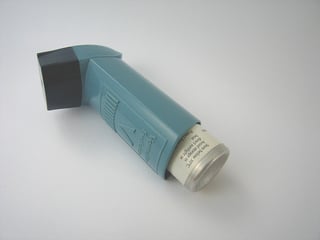- Privacy Policy
- Terms & Conditions
- Contact us
- ©Isabel Healthcare 2020
World Asthma Day 2016 - You can control your asthma symptoms
 May 3rd marked the annual World Asthma Day for 2016, helping to raise awareness of the condition and improve care around the world. There are currently approximately 17 million people suffering with asthma in the USA alone, and many others suffer the symptoms without realising they have the condition. Once discovered, it can be treated a number of different ways and can greatly improve your quality of life. The slogan for the Global Initiative for Asthma, or GINA, is “You can control your asthma” so we’ll be discussing how you can spot if you have asthma, and what can be done to help you live with the condition.
May 3rd marked the annual World Asthma Day for 2016, helping to raise awareness of the condition and improve care around the world. There are currently approximately 17 million people suffering with asthma in the USA alone, and many others suffer the symptoms without realising they have the condition. Once discovered, it can be treated a number of different ways and can greatly improve your quality of life. The slogan for the Global Initiative for Asthma, or GINA, is “You can control your asthma” so we’ll be discussing how you can spot if you have asthma, and what can be done to help you live with the condition.
What is Asthma?
Asthma is a respiratory disease, which is defined as a disease that affects the air passages, be that the lungs themselves, the bronchi, the windpipe, or the nasal passages. Asthma specifically is a heightened irritation or inflammation of the bronchi, the small tubes of cells that carry oxygen to the lungs and take away what the lungs don’t need from the air we inhale. This inflammation is then worsened when a patient comes into contact with something the bronchi sees as a threat, such as dust or pollen, causing the airways themselves to become inflamed and tighten, which causes the common asthmatic symptoms.
Symptoms and causes of Asthma
The main symptoms to look out for when you suspect yourself or a loved one, particularly a child as it is more common in children, are all based on breathing directly:
- A persistent, tickly cough at the back of the throat, particularly at night
- General shortness of breath
- Less physical stamina than others of the same age
- A tightness in the chest
- Wheezing
There are many causes for asthma, with the main cause being closely linked to both genetics and allergies. Those who suffer from inflamed bronchi also quite often suffer from sensitive allergic reactions. This is termed as an atopic patient, and those with atopy will often suffer from allergies, asthma and eczema. What’s more, it’s a vicious cycle as the allergic reactions, for example with hay fever, cause the airways to become even more inflamed and may trigger the asthma. Atopy is known to be genetic and members of a family will often all being atopic to varying degrees. Other causes of asthma can be linked to childhood trauma to the airways, for example a bad cold or case of the flu when an infant. Although not a cause itself, poor diet and fitness levels, as well as recurring respiratory illnesses, can trigger asthma patients to suffer more severe symptoms.
Treatment of asthma
Once diagnosed, asthma can be medicated to relieve symptoms. Some medications will help immediate symptoms when a patient is faced with a trigger, and can feel an oncoming attack. Other medications are taken daily to help prevent strong attacks from happening and sooth the bronchi at the root before airways become inflamed. For adults, it is often a long term condition that requires constant medication, but for children it is quite often the case that patients will grow out of their asthma as their bodies develop. As well as medication, preventative measures can be taken to avoid triggers. Allergies can be treated at the root using antihistamines or avoiding the allergen, whilst a trigger such as exercise can, contrary to popular belief, be lessened by a gradual increase in exercise; overall fitness is increased and the lungs are able to get more oxygen around the body despite inflamed bronchi and airways. It’s important to know that although you may have to live with asthma for the rest of your life, it doesn’t have to stop you from doing what you want to do.
If you have any concerns about the symptoms you are experiencing, put them into the Isabel Symptom Checker and discuss your findings with your doctor:

Jason Maude
Jason is the CEO and Co-founder of Isabel. Prior to co-founding Isabel, Jason spent 12 years working in finance and investment banking across Europe. His daughter, Isabel, fell seriously ill following a misdiagnosis in 1999 and this experience inspired Jason to abandon his city career and create Isabel Healthcare Ltd.
Subscribe Here!
Recent Posts
Virtual Triage: Do more questions lead to better patient outcomes?
One of the common misconceptions related to virtual triage / symptom checker tools is that the more..Webinar: Using Virtual Triage To Transform Patient Access
Outdated contact centers are posing problems for today's health systems. As longer hold times..List Of Categories
- Differential Diagnosis Decision Support
- Differential diagnosis
- Symptom Checker
- Symptoms
- Medical Error
- Patient Disease Information
- Disease
- Diagnostic Decision Support
- Clinical Decision Support
- Isabel 1 Minute Read
- Diagnosis Error
- Diagnosis Skills Cases
- Healthcare Informatics
- Medical Education
- Patient Engagement
- Clinical Reasoning
- Evidence-based Medicine
- Symptom Triage
- Nurse Practitioner Education
- Nursing Decision Support
- Partnership
- Public Health
- COVID-19
- EHR
- Patient Empowerment
- Patient Safety
- rare disease

Start your FREE Trial today
Try the Isabel Pro DDx generator for 30-days - no payment card details required.




